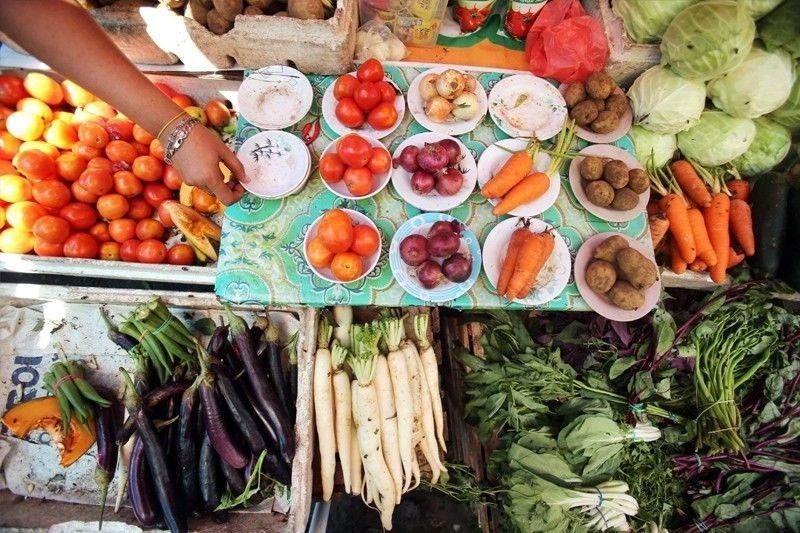Inflation eases to 4.5% in March

MANILA, Philippines — Inflation unexpectedly eased in March, halting five straight months on the upswing, as prices of most food items – except meat – slowed down, but pressure remains as the rate is still above the government’s target band for the year.
Headline inflation the rate of increase in the consumer price index went down to 4.5 percent from the two-year high of 4.7 percent in February. However, it is much quicker than the 2.5 percent recorded in the same period last year.
While the March inflation was well within the 4.2 to five percent forecast of the Bangko Sentral ng Pilipinas for the month, it still breached the two to four percent target for 2021.
Inflation for the first quarter averaged 4.5 percent.
The Philippine Statistics Authority (PSA) said the easing of inflation was largely caused by the lower annual increment in the heavily weighted food and non-alcoholic beverages at 5.8 percent from 6.7 percent. It contributed 92 percent to the downtrend.
In particular, prices of vegetables, fruits and fish all went down by almost 50 percent during the month.
In a briefing yesterday, National Statistician Dennis Mapa said this could be attributed to stable weather conditions after the consecutive storms at the tailend of 2020.
However, inflation in meat, which is the major contributor in the food category, inched up to 20.9 percent from 20.7 percent in February as the effects of African swine fever (ASF) continue to pull down supply.
The imposition of the 60-day price cap on pork and chicken still failed to bring down prices. Now, the worry lies on how much increase will be recorded as the ceiling will be lifted tomorrow, April 8.
It should be noted that apart from pork, prices of chicken and beef also registered increases, but Mapa said these did not spread to the other commodity items which contributed to the easing of overall consumer price index.
Meanwhile, transportation costs, which had a 25.5 percent share to the headline rate, accelerated to 13.8 percent as global prices of crude oil increased, which further put pressure on fares for tricycles and jeepneys already on the rise because of pandemic-related limitations in carrying capacity.
Also contributing to inflation were increases in the prices in restaurants and miscellaneous goods and services, which had an 8.9 percent share to the headline rate. This was driven by meals, articles for personal hygiene, and barbershop services.
Faster growth of 20.4 percent was seen in the transport index, still an indication of the volatile oil prices in the world market.
The Bangko Sentral ng Pilipinas, for its part, said the latest outturn is consistent with expectations, reflecting the impact of the ASF and higher global oil prices.
“Inflation is still seen to return to within-target band in 2022 as supply-side influences subside. At the same time, timely and effective implementation of direct measures by the government could contribute to easing price pressures,” BSP Governor Benjamin Diokno said.
“The ongoing pandemic also continues to pose downside risks to the inflation outlook, as the recent surge in virus infections and challenges over mass vaccination programs continue to temper prospects for domestic demand,” he said.
ING Bank senior economist Nicholas Mapa said signs of weak domestic demand continue to manifest with the recreation and culture component posting negative inflation for the ninth straight month with Filipinos likely cutting back on luxuries given the recession.
“Although it may be too early to deem the March 4.5 percent inflation the peak for the year, we do note that the likelihood of inflation hitting five percent has now diminished somewhat,” he said.
Rizal Commercial Banking Corp. chief economist Michael Ricafort, for his part, said the ongoing enhanced community quarantine in NCR and nearby provinces would help ease inflationary pressures and support accommodative monetary policy stance as the economy needs all the support that it could get amid limited funds for additional stimulus measures.
“High inflation is not needed by the local economy right now especially for households that have been hit hard by the pandemic in terms of lower income thereby requiring intervention preferably through non-monetary measures,” Ricafort said.
The BSP’s Monetary Board emphasized that prevailing monetary policy settings remain appropriate to support the government’s efforts to facilitate economic recovery.
“The timely implementation of non-monetary interventions is crucial in mitigating the impact of supply-side pressures on inflation and thereby preventing them from spilling over as second-round effects,” Diokno said.
- Latest
- Trending



























